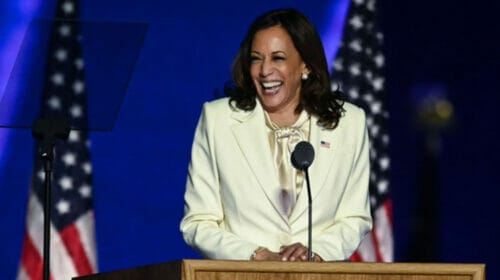State-Religion Separation’ Revisited
June 24, 2024(AGV): I have been prompted to revisit the saga concerning the separation of politics (or public affairs) and religion by the law enacted in Louisiana, USA, on June 19, 2024 mandating the display of the Ten Commandments in “large, easily readable font” in all State-funded educational and research institutions from kindergarten to universities in the State.
Freedom of worship, as well as the choice of one’s religion, is one of the basic individual rights which every government needs to formally recognize and safeguard. However, there is an apparent need for national and local governments which have a diversity of religious denominations to introduce laws designed to keep religion out of political and public affairs.
The religious conflicts currently irking Nigeria, for example, where religion, apart from ethnicity, is the most explosive issue in the country’s political arena, should underscore the necessity of such pieces of legislation. Daniel E. Agbiboa and Andrew E. Okem have succinctly described the predicament facing the country in the following words:
“Nigeria is usually characterized as a deeply divided state in which major political issues are vigorously and even violently contested along complex ethnic, religious, and regional lines.”
The laws should, among other things, ban religious activities and programs which have the potential to indoctrinate credulous members of society. Obviously, this does not imply that religious denominations in any given country should not freely advocate their values, beliefs and causes as interest groups. In a truly democratic society, any and all societal groups should have a right to seek to be heard in governmental decision making, and to articulate their demands on the government and society’s other groups and institutions.
The rationale for pieces of legislation designed to keep religion out of politics, education, and other public spheres of society that wholly or partly fall under the auspices of any given national or local government is to forestall the potential disruption of public order and socioeconomic activities by cliques of fanatics from any religious denominations.
Such legislation is particularly critical for countries where efforts by national and local governments to break the bondage of the majority of indigenous people to misery, want and destitution has been thwarted partly by violent clashes among religious sects.
Specifically, there is a need for legislative organs of national and local governments to seriously consider the prospect of DISCOURAGING or PROSCRIBING the following in a deliberate attempt to forestall the potential disruption of public order and socioeconomic activities by overzealous and chauvinistic religious leaders:
[1] The use of public funds by a local or the national government to set up a Church, a Mosque, a Synagogue, or any other kind of house of worship, and/or to provide any form of support to any given religious group, institution or activity;
[2] Official participation by government leaders in the affairs of any given religious group or institution, or official participation by any given religious leader or group in political or governmental affairs;
[3] The use of a religious platform by any individual or group of individuals to form a political party or alliance;
[4] The use of a religious platform by any individual to seek a leadership position in any of the three branches of government—that is, the legislature, the judiciary or the executive;
[5] Inclusion of denominational religious subjects in the curricula of schools funded by the government, except studies relating to world religions without delving into the content of their sacred books;
[6] Subjection of candidates for election or appointment to public office to a religious test expressly or otherwise requiring them to declare their religious affiliations;
[7] Desecration of any religious symbols or objects by any member or members of society;
[8] Religious sermons or statements by any individual or group of individuals belonging to any given religious grouping or denomination which are contemptuous to, or are designed to slight, other religious groupings or denominations, and which can ultimately lead to what may be referred to as “religious chauvinism”; and
[9] Conducting of religious sermons or ceremonies involving ten or more people in non-religious public arenas without a police permit, or conducting such activities on public modes of transportation which are not chartered by groups involved.
Some of these safeguards would, of course, need national and/or local-government legislative assemblies to prescribe the nature or kinds of punishment that would be meted out to convicted violators.
With the foregoing kinds of safeguards, a government does not need to place any restrictions on the construction of Churches, Mosques, Synagogues, Temples, or any other houses of worship, or have restraints on the expansion of any religious denomination.
In countries where law makers have not provided for such safeguards mainly due to lack of foresight, violent clashes among religious groups in their quest to dominate the political sphere, and to impose their religious laws on the citizenry, have become exceedingly difficult to contain.
The precarious problem currently facing Algeria, Nigeria, the Sudan, Afghanistan, and a host of other countries around the world which are beleaguered by religious conflicts should serve as a clear warning to all peace-loving law makers, mayors, governors, and executive presidents or prime ministers worldwide not to succumb to calls or insinuations by chauvinistic religious leaders to enact laws like the law passed in Louisiana—laws which are likely to dog their beloved countries, states, counties, or cities in perpetuity.
These countries are experiencing recurring incidents of religion-based conflicts—conflicts which have occasionally culminated in violent clashes between and/or among religious groups in their quest to dominate the political sphere and/or impose their religious laws on the citizenry.
As it is often said, prevention is better than cure! Malaysia’s Mahathir Mohammad summed up the perilous nature of religious conflicts in his address to the World Evangelical Fellowship in May 2001 in the following words: “Once started, religious … [conflicts have] a tendency to go on and on, [and] to become permanent feuds.”
Accordingly, one would perhaps do well to advise political leaders, law makers, presidents, prime ministers, governors, and mayors anywhere and everywhere to guard against enacting pieces of legislation akin to the Louisianian law and ultimately circumvent the potential for atheists, pagans and those who believe in Islam, Judaism, Buddhism, Hinduism, Sikhism, Shintoism, Jainism, the Baha’i faith, and Christianity to use educational institutions as platforms for evangelism, and for advancing their causes and promulgating their beliefs.
Finally, but certainly not least, decisions on some societal issues and matters—such as the issue that is the subject of this article and capital punishment, abortion, homosexuality, gun safety measures, legalization of cannabis, and the like—should be made by residents or the citizenry through a referendum, and after exhaustive debate on the issue, not by a Mayor, a Governor, a President, a Prime Minister, a group of law makers, or any other person or group of persons who wield the reins of power.
Decisions on such kinds of issues and matters should never be left to the whims of Mayors, Governors, executive Presidents, executive Prime Ministers, groups of law makers, or any other persons or groups of persons who wield the reins of power.




